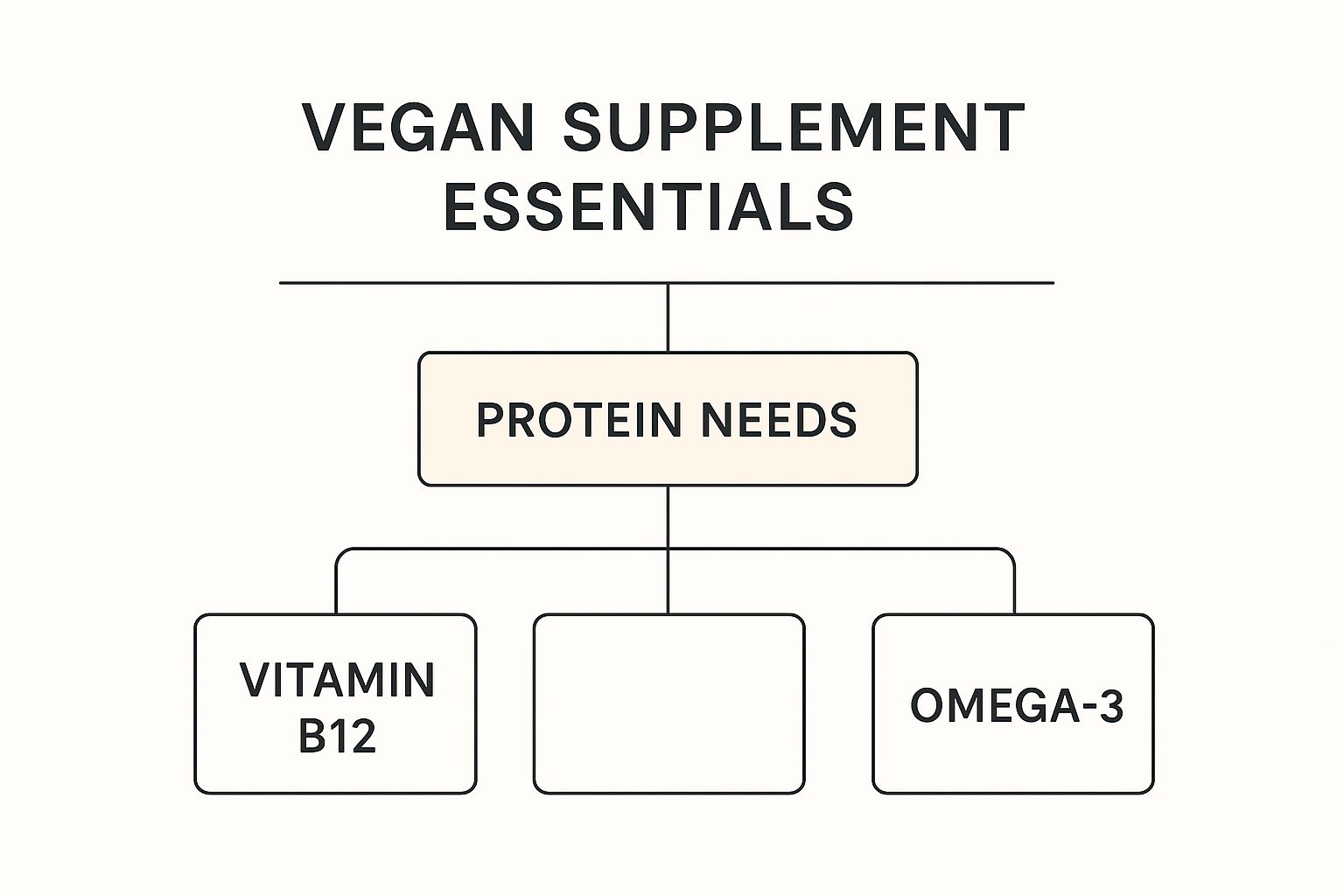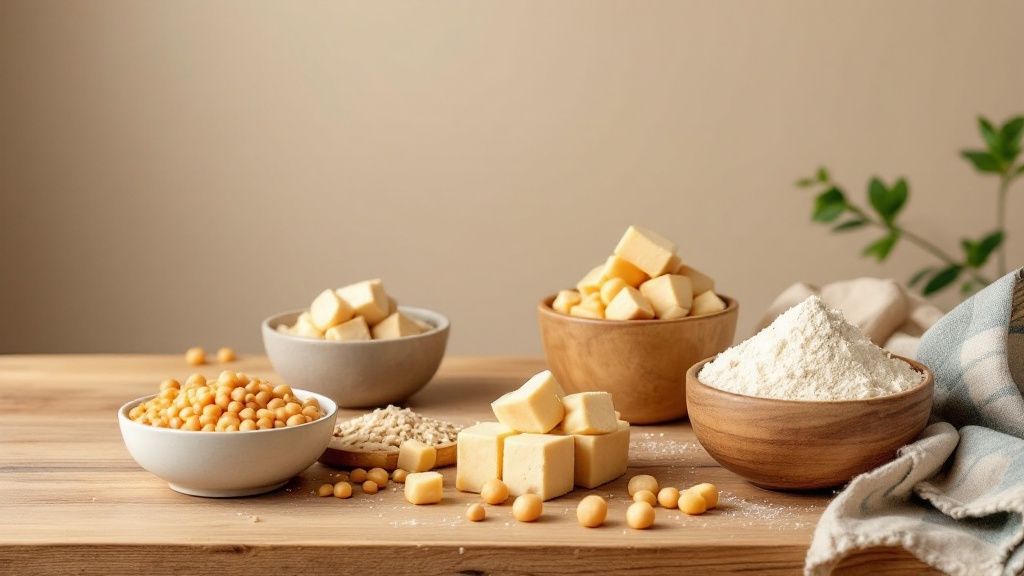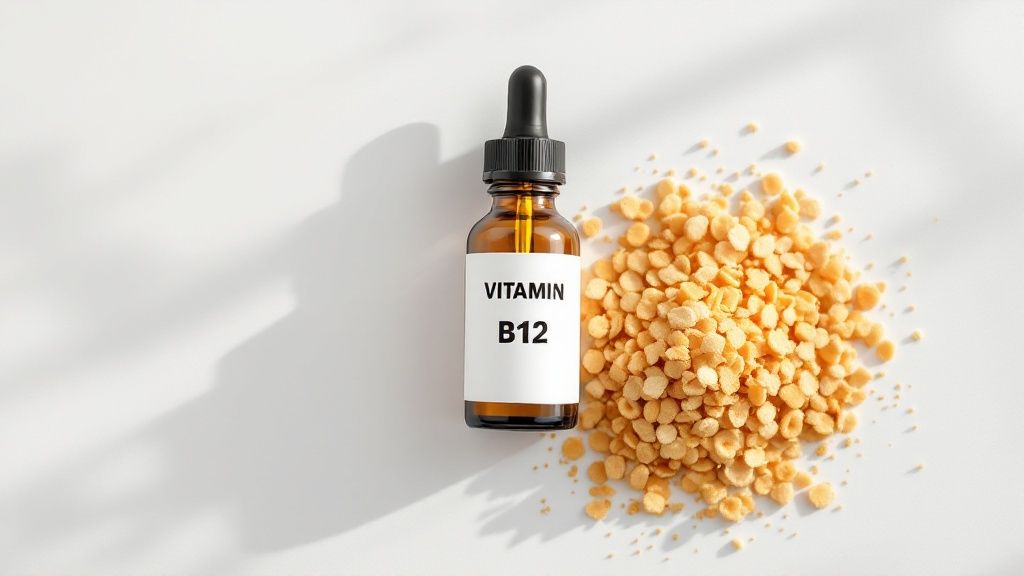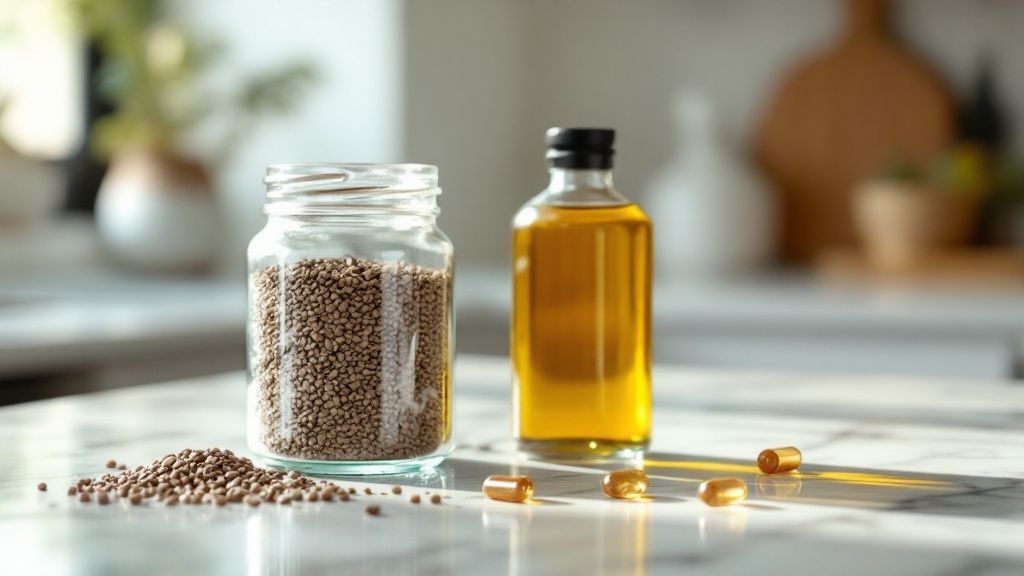Top Supplements for a Vegan Diet to Help You Thrive
So, you’ve decided to go vegan-that’s a fantastic move for your health and the planet. But let's be real, to truly feel your best and make this a sustainable lifestyle, smart supplementation isn't just a good idea; it's non-negotiable. The best supplements for a vegan diet act as a safety net, filling in the nutritional gaps for things that are tricky to get from plants alone, like Vitamin B12, Vitamin D, and specific omega-3s (EPA/DHA).
Think of them not as optional extras, but as foundational building blocks for a vibrant, energized, plant-powered life.
Your Guide to Thriving on a Vegan Diet
Welcome to the plant-based world! You’re loading up on fruits, veggies, and whole grains, yet maybe you’re still feeling a bit... off. A little tired, maybe not as sharp as you’d like? I’ve been there, and trust me, you are not alone. It’s a super common feeling, and it usually points to a few specific nutritional gaps that are surprisingly easy to fill once you know what they are.
This doesn't mean your diet is failing. It just needs a little fine-tuning. Consider supplements your nutritional support crew-a proactive strategy to ensure you’re not just surviving, but truly thriving.
Why Smart Supplementation Matters
Walking into the supplement aisle can feel like stepping into a different universe. But as more people embrace plant-based living, understanding this world is becoming essential. The global demand for vegan-friendly options is exploding-the vegan supplements market hit a value of USD 8.42 billion in 2023 and is expected to more than double by 2030. This isn't just a trend; it's a reflection of a growing collective awareness. You can discover more insights about this trend and what’s driving it.
Our goal here is simple: to cut through the noise with clear, science-backed advice. We want to demystify what you need, why you need it, and how to find supplements that actually work.
This diagram breaks down the three most critical areas to focus on when you're building your vegan supplement strategy.

As you can see, getting enough quality protein, locking down your B12 intake, and securing a reliable source of omega-3s are the absolute cornerstones for long-term health on a vegan diet.
For those just starting, here’s a quick summary of the most critical supplements every vegan should consider to cover their nutritional bases.
The 5 Must-Have Vegan Supplements at a Glance
Supplement |
Why It's Essential for Vegans |
Key Benefits |
|---|---|---|
Vitamin B12 |
Not naturally found in plant foods; crucial for nerve function. |
Supports energy, brain health, and red blood cell formation. |
Vitamin D |
Many are deficient, regardless of diet, but it’s vital for calcium absorption. |
Boosts bone health, immune function, and mood regulation. |
Omega-3s (EPA/DHA) |
Plant-based ALA conversion to EPA/DHA is often inefficient. |
Reduces inflammation, supports brain and heart health. |
Iodine |
Plant-based diets can be low in iodine without fortified foods or sea vegetables. |
Essential for thyroid function and metabolism regulation. |
Iron |
Plant-based (non-heme) iron is less bioavailable than animal-based iron. |
Prevents anemia, fights fatigue, and supports oxygen transport. |
Getting these core nutrients right will set you up for success, giving you the peace of mind to fully enjoy all the amazing benefits of plant-based eating.
Vitamin B12: The Absolute Non-Negotiable
If there’s one thing I could shout from the rooftops about vegan nutrition, it would be this: you absolutely must supplement with Vitamin B12. I’m going to be really direct here, just like Sarah Kay Hoffman would be-I do NOT think this is optional. It is the single most important, non-negotiable supplement for anyone eating a plant-based diet.

This powerhouse vitamin is essential for keeping your entire system running smoothly. Think of it as a master mechanic for your body. It helps build your DNA, creates healthy red blood cells to carry oxygen everywhere, and protects your nerve cells.
When B12 levels get low, things can get serious. We're talking about anemia, chronic fatigue, and even irreversible nerve damage. This isn't just about feeling tired; it's about your long-term brain health and energy. This is one area where we simply can't afford to guess.
Why You Can't Get B12 From Plants
Here's the crux of the issue: Vitamin B12 is produced by microorganisms in soil and water, not by plants or animals themselves. Animals get it from the environment or bacteria in their gut, and it builds up in their tissues. Since a vegan diet excludes animal products, there are no reliable, natural plant-based sources of B12.
Let's bust a few stubborn myths right now:
-
Unwashed produce: The idea that you can get enough B12 from soil on unwashed veggies is just not realistic or safe. You’d have to eat a lot of dirt to get a meaningful amount, which isn't exactly a great health strategy.
-
Fermented foods: While foods like tempeh or kimchi might contain trace amounts of B12, they are often inactive forms that your body can't actually use. Relying on them is a gamble you don’t want to take with your health.
-
Nutritional yeast: Some nutritional yeast is fortified with B12, and it’s a fantastic addition to your diet! But not all brands are. You have to check the label carefully, and even then, the amount can vary.
The bottom line is simple and clear: The only dependable way for a vegan to get sufficient Vitamin B12 is through fortified foods or a dedicated supplement.
Choosing the Right Kind of B12
When you start looking for a B12 supplement, you'll mainly run into two forms: cyanocobalamin and methylcobalamin. It sounds technical, but the difference is pretty straightforward.
Cyanocobalamin is the synthetic, more stable form. It's the most studied and commonly used in fortified foods. Your body has to convert it into an active form before it can be used.
Methylcobalamin, on the other hand, is a naturally occurring, active form. This means your body can use it right away without any extra steps. Some research suggests this may lead to better retention and use within the body.
For this reason, many people prefer methylcobalamin for its superior bioavailability. It's the form we trust and use in our own Yuve Vegan B12 supplement because we believe in giving your body the most direct and effective support possible.
How Much B12 Do You Really Need?
So, how do you make sure you’re getting enough? Your body is pretty good at storing B12, so a deficiency can take years to show up. But you definitely don’t want to wait until symptoms appear. Being proactive is the name of the game.
Most health organizations recommend that adults get around 2.4 micrograms (mcg) of B12 per day. However, since absorption can be limited, taking a higher dose less frequently is a common and effective strategy.
A daily supplement of 250 mcg or a weekly dose of 2,500 mcg are typical recommendations that work well for most people.
To really be sure about your B12 status, consider getting an active B12 blood test. It measures the form of the vitamin that's actually available for your body to use. This gives you and your doctor a crystal-clear picture of your levels and takes all the guesswork out of your health routine.
Establishing a consistent health routine can be essential in maintaining overall well-being. Incorporating balanced nutrition, regular physical activity, sufficient sleep, and stress management techniques are among the components that contribute to a healthy lifestyle.
Including supplements can also be a part of this routine, especially for those following specific dietary choices. For instance, Yuve Vegan B12 is a supplement designed to support individuals who may have limited natural sources of B12 in their diet. It provides a convenient way to help maintain adequate B12 levels, which are important for energy production and neurological function. For more information, you can visit our website.
Vitamin D and Calcium: The Bone Health Power Couple
Let's talk about one of the most crucial partnerships in nutrition: Vitamin D and Calcium. I like to think of them as a dynamic duo working together to keep your bones strong and resilient. One simply can't do its job effectively without the other-it's a team effort, and when they're in sync, your body really thanks you for it.

You might be diligently loading up on calcium-rich plant foods like fortified non-dairy milks, kale, and broccoli. That's fantastic! But here’s the thing-your body can't properly absorb and use all that wonderful calcium without enough Vitamin D.
It’s like having a key (calcium) but needing a gatekeeper (Vitamin D) to actually unlock the door to your bones and let it in.
Why Sunlight Isn't Always the Answer
Our main source of Vitamin D isn't actually food; it's the sun. Our skin is amazing and produces it when exposed to sunlight. But let's be realistic-how many of us are consistently getting enough sun all year?
Many of us live in less-than-sunny climates, spend our days working indoors, or responsibly wear sunscreen (which is vital for skin health!). This reality is why Vitamin D deficiency has become so common, affecting vegans and non-vegans alike.
In fact, even major health authorities like those in the UK now recommend that all adults take a Vitamin D supplement during the darker autumn and winter months. This makes supplementation one of the most reliable ways to keep your levels where they need to be. It isn't a flaw in a vegan diet; it's a smart adaptation to our modern, often indoor, lives.
D3 vs. D2: What’s the Difference?
When you start looking for a Vitamin D supplement, you'll run into two main forms: D2 (ergocalciferol) and D3 (cholecalciferol).
-
Vitamin D2: This form is always derived from plant sources.
-
Vitamin D3: Traditionally, this came from lanolin (an oil from sheep’s wool). But now, it's widely available from a completely vegan source-lichen.
For years, D3 was a no-go for vegans. The discovery of lichen-based D3 changed everything, giving us a fantastic plant-based option. This is huge, because study after study has shown that D3 is more effective at raising and maintaining Vitamin D levels in the body compared to D2.
Choosing a lichen-derived D3 is one of the smartest moves you can make for your supplement routine. If you want to dive deeper, you can learn everything you should know about Vitamin D here.
A Note From Our Founder, Sam
“I used to think that as long as I got outside for a walk, my Vitamin D levels would be fine. But after a long winter, I was feeling constantly run down and my mood was just flat. It wasn't until I got my levels checked and started supplementing with a quality plant-based D3 that I realized what I was missing. Getting that D and calcium balance right was a total game-changer for my energy and resilience. It’s a simple change that made a world of difference in how I felt day-to-day.”
Your Action Plan for Strong Bones
Getting this duo right is simpler than it sounds. It’s all about being mindful and consistent.
Here’s a quick guide to get you started:
-
Eat Your Greens (and More!): Keep enjoying those calcium-rich plant foods like fortified tofu, leafy greens, almonds, and fortified milks.
-
Choose a High-Quality D3: Opt for a vegan Vitamin D3 supplement derived from lichen. This ensures you're getting the most effective form to help your body absorb that calcium.
-
Get Tested: If you're concerned about your levels, just ask your doctor for a simple blood test. It takes all the guesswork out and lets you know exactly what your body needs.
By pairing your calcium-rich diet with a reliable Vitamin D supplement, you're doing more than just supporting your bones. You're also giving your immune system a boost and helping maintain a stable, positive mood. It’s a powerful combination that helps you build a strong foundation for your health for years to come.
Iron and Iodine: The Two Minerals You Might Be Forgetting
Ever feel like you're doing everything right-eating clean, vibrant, plant-based foods-but still feel a bit sluggish? It's a common story. Often, the culprits are two minerals that don't always get the same airtime as B12 or Vitamin D: iron and iodine. These guys are absolute powerhouses for your energy and metabolism, and getting them dialed in can be a total game-changer.

Let's break down why these two quiet but crucial nutrients deserve a front-row seat in your wellness plan. We’ll keep it simple, actionable, and focused on helping you feel your absolute best.
The Iron Story: What Every Vegan Should Know
Think of iron as the oxygen delivery service for your entire body. It picks up oxygen from your lungs and drops it off at every single cell. When you're running low on iron, those deliveries get delayed, and the result is that all-too-familiar feeling of fatigue, brain fog, and a general lack of get-up-and-go.
Now, plant-based diets are overflowing with iron-rich foods-lentils, spinach, tofu, and beans are fantastic sources. The catch? Plants provide a type of iron called non-heme iron. It’s a bit more stubborn for our bodies to absorb compared to the heme iron found in animal products.
But that’s not a deal-breaker. Not at all. It just means we need to be a little strategic.
A Simple Trick for Better Absorption: One of the easiest and most powerful ways to boost non-heme iron absorption is to pair it with Vitamin C. Vitamin C acts like a key, unlocking the iron and making it much more available for your body to grab onto and use.
Here’s what that looks like in the real world:
-
Squeezing fresh lemon juice over your lentil soup.
-
Tossing some bright red bell peppers into your tofu stir-fry.
-
Enjoying a small glass of orange juice with your morning oatmeal and seeds.
It's a small tweak that makes a massive difference in how much iron your body actually gets from your food.
Iodine: Your Metabolism's Best Friend
Next up is iodine, a mineral that is absolutely essential for a healthy thyroid. Your thyroid is basically the command center for your metabolism, and iodine is the fuel that keeps the whole operation running smoothly.
The most common dietary sources of iodine are seafood and dairy, both of which are off the menu for vegans. While some plant foods do contain iodine, the amount can be wildly inconsistent because it depends entirely on the soil they were grown in.
You might think iodized salt is the answer, but it's not always a reliable strategy. Many people are consciously reducing their sodium intake or prefer using specialty salts like pink Himalayan or sea salt, which usually don't contain any added iodine.
This is where a good supplement can be a vegan's best friend. A natural, kelp-based supplement offers a consistent, reliable, and plant-based source of iodine, taking all the guesswork out of supporting your thyroid. It's a simple, proactive step to keep your energy levels stable and your metabolism humming.
This growing awareness of nutritional details is a big reason why the vegan supplements market has exploded. Valued at around USD 8.5 billion in 2024, the industry continues to grow as more people seek out transparent, high-quality, plant-based solutions. You can learn more about these market findings to see just how much the demand for quality is shaping the industry.
By giving these two often-overlooked minerals the attention they deserve, you're fine-tuning your body for peak performance. You're making sure you have everything you need not just to function, but to truly thrive.
Omega-3s: Your Brain and Heart Health Booster
Let's talk about the superstar fatty acids you’ve probably heard a ton about: Omega-3s. They're absolutely essential for keeping your brain sharp, your heart healthy, and taming inflammation. But there’s a huge misconception out there-that fish oil is the only way to get the good stuff.
As a vegan, you’re likely already eating foods rich in a type of Omega-3 called ALA (alpha-linolenic acid), which you'll find in things like flaxseeds, chia seeds, and walnuts. That’s a fantastic start!
The catch? ALA is just the starting block. To truly unlock the benefits, our bodies need to convert it into two other, much more powerful forms: EPA (eicosapentaenoic acid) and DHA (docosahexaenoic acid). These two are the real heavy lifters when it comes to your cognitive function, mood, and cardiovascular health.
The Conversion Challenge: Why ALA Isn't Enough
Here’s where we get into the nitty-gritty, and we want to be direct with you. Our bodies are, frankly, not very good at this conversion process. Think of it like trying to build a complex Lego castle with only a handful of the right bricks-it's possible, but incredibly inefficient.
Studies show that the conversion rate of ALA to EPA is already quite low, and the conversion to DHA is even lower, often less than 1%. This means that even if you’re eating handfuls of flaxseeds, you’re likely not getting the optimal amount of EPA and DHA your brain and heart are craving. Relying solely on ALA is a gamble with your long-term health.
This inefficiency is why a direct source of EPA and DHA isn't just a good idea for vegans; it’s a game-changer. It bypasses the unreliable conversion process entirely, delivering these critical nutrients right where they need to go. If you're interested in going deeper, you can explore some of the best vegan sources of Omega-3 fatty acids in our detailed guide.
Algae Oil: The Smarter, Cleaner Choice
So, if we're skipping fish, where do we get this direct source of EPA and DHA? The answer is beautifully simple: algae oil!
Here's a fun fact: fish don't actually produce their own Omega-3s. They get them by eating microalgae. By going straight to the source, we get a cleaner, more sustainable, and completely vegan form of these essential fats.
Choosing algae oil means you get all the brain and heart benefits without the heavy metals, PCBs, and other contaminants often found in fish oil. It’s better for your body and kinder to our oceans.
This is exactly why we created Yuve’s Algae Omega-3. We wanted to provide a pure, potent, and direct source of vegan EPA and DHA to support your health without compromise. It’s a simple, proactive step to ensure you’re nourishing your body at the cellular level.
Beyond just supplementing, it's often beneficial to understand your baseline. Getting a clear picture of what your body truly needs is powerful, which is why we recommend looking into the importance of testing your Omega-3 levels.
How to Choose Vegan Supplements You Can Trust
Walking down the supplement aisle can feel like navigating a maze. With rows of bottles all making bold promises, how do you know what’s genuinely good for you and what’s just clever marketing? It’s easy to feel lost, but we're here to help you turn that confusion into confidence.
This isn’t about just picking a bottle off the shelf; it's about becoming a smart, informed shopper. We’ll go through exactly what to look for on a label, how to spot the red flags, and how to pick products that will actually support your health. Think of this as your personal field guide to the world of vegan supplements.
Decoding the Label Like a Pro
The real secret to finding a great supplement isn't on the front of the bottle-it's in the fine print on the back. That’s where the truth is.
Here’s what you should be looking for:
-
Third-Party Certifications: Keep an eye out for seals from independent organizations like NSF, USP, or Informed-Sport. These logos aren't just for show. They're your proof that an outside group has tested the product to confirm it contains exactly what the label says it does and isn't contaminated with anything harmful.
-
Bioavailable Ingredients: It’s one thing to take a nutrient; it’s another for your body to actually use it. Look for active, easily absorbed forms of vitamins, like methylcobalamin for B12 or plant-based D3 from lichen. These are far more effective than cheaper, synthetic versions.
-
Clean and Clear Formulas: The best supplements have what you need and nothing you don’t. That means no artificial colors, unnecessary fillers, or strange additives. A short, understandable ingredient list is always a good sign.
At Yuve, this is something we’re passionate about. We focus on clean, plant-based, and effective formulas because you should never have to wonder about what you're putting into your body.
Red Flags to Watch Out For
Knowing what to avoid is just as important as knowing what to look for. Some companies use tricky tactics to cut corners, and that’s a hard pass from us.
Be on the lookout for these common red flags:
Proprietary Blends: This is a big one. It’s a marketing term for a laundry list of ingredients grouped together under a single name, without disclosing the exact amount of each one. This makes it impossible to know if you're getting a meaningful dose of anything or just a sprinkle of everything. Always opt for products with fully transparent labels.
It’s also wise to be skeptical of hype. The vegan supplement market is growing fast-it's projected to hit nearly USD 18.8 billion globally by 2035. You can discover more insights about this growing market to see just how big it's getting. With that much money on the line, there’s a lot of noise. Your best defense is a critical eye and a solid checklist.
Your Quality Checklist for Vegan Supplements
Ready to put your newfound knowledge into action? Use this simple checklist the next time you're shopping to quickly spot the high-quality, trustworthy vegan supplements.
Quality Factor |
What to Look For |
Why It Matters |
|---|---|---|
Transparency |
Clear, specific dosages for every single ingredient listed. |
You know exactly what you're getting and can ensure it's an effective amount. |
Certifications |
Seals from third-party testers like NSF, USP, or a GMP-certified facility. |
Provides independent verification of purity, potency, and safety. |
Clean Ingredients |
A short list of recognizable, plant-based ingredients without artificial junk. |
Minimizes your exposure to unnecessary fillers, allergens, and synthetic additives. |
Bioavailability |
Active, easily absorbed forms of nutrients (e.g., methyl B12, D3 from lichen). |
Ensures your body can actually use the nutrients you're taking for maximum benefit. |
Keep this checklist handy, and you’ll be able to cut through the marketing clutter and choose supplements that genuinely contribute to your well-being.
Common Questions About Vegan Supplements
Diving into the world of supplements can feel a bit overwhelming at first, and it's totally normal to have questions. You want to make sure you're doing what's best for your body, right? We get it. Let's walk through some of the most common questions we hear and clear things up so you can feel confident on your plant-based journey.
Do I Really Need Supplements If I Eat a Healthy Vegan Diet?
This is the big one, the question on everyone's mind. And the straight answer is: yes, you do. You can be eating the most beautiful, nutrient-dense, whole-food vegan diet imaginable, and you'll still have a few critical gaps.
Some nutrients are either impossible or just plain difficult to get from plants alone. Vitamin B12 is the classic example-it simply isn't found in plant foods. Others, like Vitamin D (especially if you live somewhere with long winters), iodine, and the crucial Omega-3s EPA and DHA, are also incredibly tough to get enough of without a little support.
Think of supplements not as a crutch, but as a smart insurance policy. They’re the safety net that fills in the very specific nutritional gaps inherent in a plant-based diet, allowing you to truly thrive for the long haul.
Can I Just Take a Single Vegan Multivitamin?
A good vegan multivitamin is an excellent starting point-it's your daily nutritional backstop. But thinking of it as a one-size-fits-all solution might not be the whole picture. The reality is, dosages vary wildly between brands, and a general multi might not have enough of certain key nutrients to meet your personal needs.
For instance, your multivitamin probably has some Vitamin D, but is it enough to get you through a dark, cloudy winter? It might contain ALA for Omega-3s, but your body and brain really need direct sources of EPA and DHA, which a multi often lacks.
Our advice? Start with a solid, trusted multi like Yuve’s Vegan Multivitamin as your daily foundation. From there, you can personalize your routine by adding specific supplements-like our Algae Omega-3 or an extra iron tablet-based on your lifestyle, diet, and ideally, after a quick chat with your doctor.
How Long Until I Notice the Benefits of Taking Supplements?
This is where a little patience goes a long way. The timeline really depends on the specific nutrient and where your body's levels were to begin with.
-
If you're low on B12, you might feel a real difference in your energy and mental clarity within just a few weeks. The turnaround can be surprisingly fast.
-
For nutrients like Vitamin D and iron, it’s more of a long game. It can take a few months of consistent daily use to build your body's stores back up to where you feel a significant shift.
The single most important factor is consistency. Don't think of it as a quick fix. See it as a long-term investment in your well-being. Stick with it, and your body will definitely thank you.
Are There Any Side Effects to Watch Out For?
For the most part, high-quality vegan supplements are very safe and well-tolerated, as long as you stick to the recommended dosages on the label. This is one area where the "more is better" mindset doesn't apply.
Taking excessively high doses of certain minerals can cause problems. Too much iron, for example, can lead to an upset stomach for some people. That's why following the product guidelines is so important.
It's always a smart move to talk with a doctor or registered dietitian before you start any new supplement routine. This is especially true if you have any pre-existing health conditions or are taking other medications. They can help you make the best choices for your unique body.
At Yuve, our mission is to make your wellness journey simple and effective. We focus on creating clean, plant-based supplements you can trust, freeing you up to live a vibrant, energized life.
Ready to build your perfect vegan supplement routine? Explore our full range of plant-based wellness products today!
